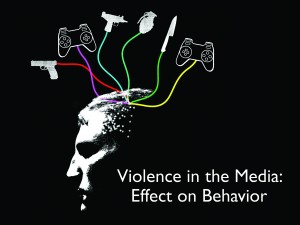 One of the noteworthy changes in our social environment in the 20th and 21st centuries has been the infiltration of our culture and daily lives by the mass media. In general, researchers define violence in media as visual portrayals of physical aggression by one human or human-like character against another.
One of the noteworthy changes in our social environment in the 20th and 21st centuries has been the infiltration of our culture and daily lives by the mass media. In general, researchers define violence in media as visual portrayals of physical aggression by one human or human-like character against another.
Violence is unfortunately one of the most popular forms of entertainment; over 60% of our prime time television shows contain some form of violence in a way or more. In many countries, there is an average of five to ten aggressive acts per hour are being shown. Most studies show that the relation between media violence and ‘real’ violence is interactive: media can contribute to an aggressive culture; people who are already aggressive use the media as further confirmation of their beliefs and attitudes, which, in turn, are reinforced through media content.
“The effects of media are cumulative and subtle and insidious and occur over a long period of time,” said Dr. Victor C. Strasburger, an expert on children and media at University of New Mexico School of Medicine. He believes media, which “have become kind of electronic parents,” are “one of the most powerful influences on children and teens that we know of and unfortunately underappreciated” by most everyone.
Exposure to media violence can cause short-term and long-term effects on our children and adults. The primed concepts make behaviors linked to them more likely, when media violence primes aggressive concept the aggression is more likely. Media violence can arouse aggressive behavior in short run more likely for two possible reasons―excitation transfer and general arousal. In recent year it has been observed that human and primate young have the tendency to imitate whatever they observe. Similarly when children observe violent behavior, they are more prone to mimic it. On the other hand, the long term content effects are due to the observational learning of cognitions and behaviors and the activation and desensitization of emotional processes.
It seems more likely to me that more time spent watching TV means less time for social activities and it is this which causes aggression. Parents need to monitor the activities of their children and the change in their behavior while mimicking the aggression they are exposed to while watching television.
Author:
 The writer has a degree in Media, writer, a passionate lover of K-pop and Asian dramas, volunteered for the humanitarian causes at The Fountain House and Akhuwat and among all a cookie monster.
The writer has a degree in Media, writer, a passionate lover of K-pop and Asian dramas, volunteered for the humanitarian causes at The Fountain House and Akhuwat and among all a cookie monster.
